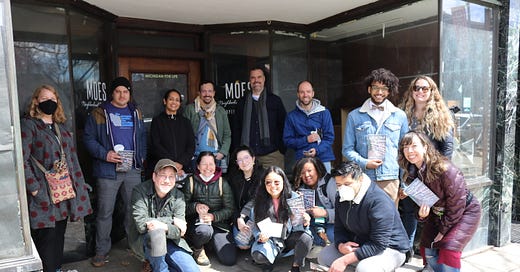Sending a quick note before the holidays to thank all of you for subscribing to The Reported Essay. It is hard to believe I started this newsletter in September, and it has grown so steadily within the last three months.
I deeply appreciate your support, and I’m grateful to those of you who have generously shared and recommended it. You are helping this newsletter find its audience—anyone interested in narrative nonfiction, literary journalism, feature writing, longform, reported essays, freelancing, and craft, all of which I have taught or practiced for the last two decades.
At The Reported Essay, I have shared interviews with some talented longform freelance writers, including: Alice Driver, Kerra Bolton, Joe Sexton, Kim Cross, Abigail Covington, and Lynell George—on how they approach nonfiction storytelling, and dissecting how they reported, wrote, edited or published particular pieces. Narrative nonfiction author Donovan X. Ramsey also dropped in for a Q&A with my students, which we shared. I will post a new Q&A with author and journalist Prachi Gupta, as well as others, in 2025. Thank you to all of these writers for their time and insights.
In the coming year, I hope to continue spotlighting folks for a series on Finding the Longform Idea, with tips I’ve learned along the way, and advice from other writers. So far I am grateful to Katia Savchuk and Alizeh Kohari, who delved into their own approaches to the story hunt. I hope to also do more Q&As with longform editors, digging into: How do you become an editor? What does the job involve? How do you approach editing and assigning stories? How do you make a story stronger?
The Institute for Independent Journalists recently launched a new podcast on the art and business of freelance journalism, “The Freelance Journalism Podcast,” and in 2025 I will drop into the show every so often to interview journalists and editors. It was fun to do my first IIJ podcast interview this year with former GQ editor Chris Gayomali, who has been on both the editing and freelancing sides of the business. He also offered craft tips for The Reported Essay.
Please don’t forget to sign up for the IIJ 2025 Freelance Journalism Conference: “Beyond Surviving: a Conference on Taking Big Swings and Building Resilience in Tough Times,” which will be held virtually on Feb 27 - Feb 28. We already have some fantastic guests lined up.
When it comes to craft and reporting, it’s an area we are all constantly learning, building upon, and studying. At The Reported Essay, we’ve talked about writing “the other,” trauma-informed reporting, interviewing, positionality, write-arounds, story structures, science writing, music writing and, of course, reported essays. I also shared my “Tale of 20 Pitches,” a behind-the-scenes look at what it can be like to try to publish the stories you care about. It was nice to see this week that one of those freelance pieces, “Maui on Fire,” made The Cut’s 20 Most-Read stories of 2024.
I look forward to sharing more insights on craft and the writing life—from storytelling decisions, to rejected or accepted pitches, to killed stories, to book writing, to reporting adventures and challenges in 2025.
Also, thank you to my dear friend and fellow freelance journalist, Rebecca Tuhus-Dubrow, for back reading The Reported Essay posts before they go live. She has a new book coming out in 2025: “Atomic Dreams: The New Nuclear Evangelists and the Fight for the Future of Energy,” which began as this New Yorker piece, and I look forward to sharing a Q&A with her soon.
Lastly, when it comes to your best ideas and stories—whether you are seeking grant funding for a longform journalism project or book, or you worked on a story you are proud of this year and want to submit it for an award—I encourage you to start with this calendar of deadlines that I’ve put together below (*I will update this list and add to it as I hear of more opportunities, so bookmark. Some deadlines are TBA).
I’ve been on various sides of this process over the years—applying for grants, awards or fellowships, receiving some, getting rejected from others. I’ve also had a chance to be a part of various selection and award committees. I know how subjective the process can be, which is why I want to tell you: Just go for it, even if you have imposter syndrome or feel unsure.
When it comes to awards, freelance writers are not always on the radars of committees nominating internally in media organizations, as staff writers might be. But that does not mean your work is not worthy. In addition to staff submissions, these awards and fellowships listed below all take freelance submissions—even the Pulitzer Prizes.
I will be back with more at The Reported Essay in 2025. Until then, have a wonderful holiday season and a happy new year!
A Winter 2025 Deadline List for Fellowships, Funding & Awards:
JANUARY
The Knight Science Journalism Fellowship Program at MIT, which supports journalists specializing in science, health, technology and environmental reporting to spend a year on a passion project while learning at MIT, along with an $85,000 stipend. Apply by January 15th.
The John S. Knight (JSK) Journalism Fellowships at Stanford, designed for journalists who are committed to preserving democracy’s promise and are working to reimagine journalism. Individual coaching and workshops, and a stipend of $125,000. The deadline to apply is January 15th.
Ira A. Lipman Fellowship, which supports significant reporting on civil or human rights. This is a non-residential program at Columbia Journalism School, in which fellows have access to the resources and university libraries. Two fellows will receive $10,000 to produce a 5,000-word story or series. Deadline to apply is January 17th.
The O'Brien Fellowship in Public Service Journalism at Marquette University, which provides reporters the tools they need to document inequity and examine potential solutions in an in-depth, nine-month reporting project of their choosing. Apply for the $75,000 fellowship by January 19th.
Columbia University awards Pulitzer Prizes in 15 journalism categories. The winners are chosen by the Pulitzer Prize Board, which seeks to recognize journalistic excellence in eligible U.S. news organizations. Freelance reporters, photographers, cartoonists, columnists, critics or bloggers who produce work in print or online may enter the competition if their submitted work has been published by eligible newspapers, magazines or news sites. Deadline to submit is January 27th.
The Dart Awards for Excellence in Coverage of Trauma, which recognize exemplary journalism about the impact of violence, crime, disaster and other traumatic events on individuals, families and communities. Entries should focus on the experience of victims and survivors as well as contribute to public understanding of trauma. Submit by January 28th.
The Fund for Investigative Journalism provides grants and other support for reporters to produce high-quality, unbiased, nonpartisan investigative stories that have an impact. Freelance journalists, staff reporters and media outlets are eligible for grants. Regular grant proposals reviewed three to four times a year for grants up to $10,000. The winter deadline is January 27th. Seed funding small grants of up to $2,500, for preliminary reporting that can lead to full investigations. The winter deadline for seed grants is January 31st. FIJ also offers expedited grants, follow-up grants of up to $2,500; and emergency grants: “Threats to Democracy in the U.S,” for up to $10,000 (rolling deadline).
The Ferriss UC Berkeley Psychedelic Journalism Fellowship, which offers ten $10,000 reporting grants per year to journalists reporting in-depth print and audio stories on the science, policy, business and culture of this new era of psychedelics. Apply by January 31st.
The Nieman Fellowship, where journalists spend two semesters at Harvard University, participating in events, master classes, and collaborating with peers. Nieman Fellows receive a stipend of $85,000 paid over a nine-month period to cover living costs, a health insurance supplement, and can attend Harvard classes. Deadline is January 31st.
The Victor K. McElheny Award recognizes outstanding coverage of science, public-health, technology, or environmental issues at the local or regional level. Winners receive a $10,000 award. Deadline to apply is January 31st.
FEBRUARY
The Knight-Wallace Fellowships offer journalists time and resources to spend an academic year at the University of Michigan and dive into a journalism project. Fellows are chosen to spend eight months in Ann Arbor, receiving private seminars, workshops, and an $85,000 stipend. (Note: I was a Knight-Wallace Fellow, and it was a truly enriching experience involving career coaching, immersive reporting projects, master classes, and bonding moments—kind of like group therapy for journalists). Deadline to apply for the 2025-2026 academic year is February 1st.
The National Association of Science Writers’ Science in Society (SIS) Journalism Awards and Excellence in Institutional Writing Awards (EIWA), recognizes some of the best science journalism and science writing. Categories include Books, Science Reporting, Science Features, Longform Narratives, Series, and Commentary. The winner or winning team for each category receives a $2,000 prize. Deadline to enter is February 1st.
New America’s Fellows Program, for journalists, scholars, filmmakers, and public policy analysts who generate big ideas that have an impact. New America provides stipends of $15,000 to $30,000 to support the work of its fellows. The deadline to apply is February 3rd.
The Pulitzer Center recently announced an editorial grant, designed for journalists, which aims to support investigative projects that examine how domestic and international climate policies influence the governance of rainforest and ocean ecosystems. Deadline is February 15th.
Banff Centre for Arts and Creativity (Literary Journalist-in-Residence). This two-week residency encourages the exploration of new ideas in literary journalism. Designed to challenge and stimulate, the program aims to inspire creative pieces of non-fiction and to assist the writers in their completion. Scholarships are available to cover the $3,500 cost. Deadline TBA.
MARCH
The National Endowment for the Arts (NEA) Creative Writing Fellowships program, which offers $50,000 grants in prose (fiction and creative nonfiction) and poetry to published creative writers that enable recipients to set aside time for writing, research, travel, and general career advancement. The program operates on a two-year cycle with fellowships in prose and poetry available in alternating years. For 2026, fellowships in prose are available. Applications are due March 12.
The Silvers Grants for Work in Progress. Apply for up to $10,000 to support long-form writing in the fields of literary criticism, arts writing, political analysis, and/or social reportage. Accepting applications for the 2025 Silvers Grants between February 1st and March 31st.
The Greater Good Science Center, with funding from the John Templeton Foundation, will distribute grants of between $5,000 and $50,000 to two dozen journalists and media producers who approach the topic of love from a variety of angles and across a range of media, including articles, videos, radio stories, podcasts, social media content, and more. The grants are part of the GGSC's Spreading Love Through the Media project. The submission window opens January 7, and the application deadline is March 24th.
The McGraw Business Fellowship accepts applications twice a year. The program provides reporting grants of up to $15,000 and support for freelance or staff journalists to produce high-impact enterprise and investigative stories. Applications for the Spring 2025 fellowships are due March 31st.
The Eric and Wendy Schmidt Awards for Excellence in Science Communications for individuals on the frontlines of science communication, science journalism, or research, developing high-quality, engaging science communications or reporting. In 2024, a total of 24 awards were given — nine for science communication by research scientists, nine awards for science journalists, and six awards for science communicators. In each category, one $40,000 top prize and two $20,000 awards were given, totaling $640,000. Deadline TBA.
The Arthur L. Carter Journalism Institute’s Reporting Award, which provides up to $12,500 for a significant work of journalism on an under-reported subject in the public interest. Cites the need for encouraging enterprising journalism during a time of extensive layoffs and budget cuts throughout the journalism industry. Deadline TBA.
The Economic Hardship Reporting Project, which gives grants to independent journalists reporting on issues related to poverty, economic class, workers’ rights, and income disparity in the U.S., and co-publishes their work in partnership with major media outlets. News stories, $800–1,500; narrative features, $1–1.25/word; investigative reports, $1–1.25/word; documentaries: typically supporting short documentaries up to $5,000; smaller nonfiction comics or illustrated works can receive $500–1,000; larger projects are capped at $2,500; photo essays, $500 a day, typically capped at five days; audio projects: typically $1,500–4,000. Rolling deadline.
Type Investigations: Funding for investigative features between 3,000 and 5,000 words. Typical budgets range from $3,000 to $6,000. Rolling deadline.
The Pulitzer Center provides support through short-term grants and year-long reporting fellowships for freelance and staff journalists worldwide. Deadlines for various grants offered throughout the year.
*If I missed any awards or fellowships, please DM me to add. I will update as they come.










apply for the Knight Fellowship at Stanford. one of the best things i ever did.
Thank you for your Winter 2025 compilation! This is such a gift and opportunity.